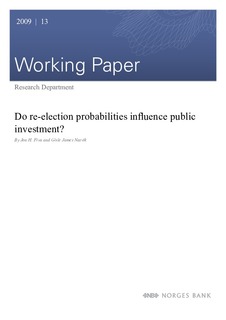| dc.contributor.author | Fiva, Jon H. | |
| dc.contributor.author | Natvik, Gisle James | |
| dc.date.accessioned | 2018-05-08T12:56:18Z | |
| dc.date.available | 2018-05-08T12:56:18Z | |
| dc.date.issued | 2009 | |
| dc.identifier.isbn | 978-82-7553-510-6 | |
| dc.identifier.issn | 1502-8143 | |
| dc.identifier.uri | http://hdl.handle.net/11250/2497630 | |
| dc.description.abstract | We identify exogenous variation in incumbent policymakers’ re-election probabilities and explore empirically how this variation affects the incumbents’ investment in physical capital. Our results indicate that a higher re-election probability leads to higher investments, particularly in the purposes preferred more strongly by the incumbents. This aligns with a theoretical framework where political parties disagree about which public goods to produce using labor and predetermined public capital. Key for the consistency between data and theory is to account for complementarity between physical capital and flow variables in government production. | nb_NO |
| dc.language.iso | eng | nb_NO |
| dc.publisher | Norges Bank | nb_NO |
| dc.relation.ispartofseries | Working Papers;13/2009 | |
| dc.rights | Attribution-NonCommercial-NoDerivatives 4.0 Internasjonal | * |
| dc.rights.uri | http://creativecommons.org/licenses/by-nc-nd/4.0/deed.no | * |
| dc.subject | JEL: E62 | nb_NO |
| dc.subject | JEL: H40 | nb_NO |
| dc.subject | JEL: H72 | nb_NO |
| dc.subject | political economics | nb_NO |
| dc.subject | strategic capital accumulation | nb_NO |
| dc.subject | identifying popularity shocks | nb_NO |
| dc.title | Do Re-Election Probabilities Influence Public Investment? | nb_NO |
| dc.type | Working paper | nb_NO |
| dc.description.version | publishedVersion | nb_NO |
| dc.subject.nsi | VDP::Samfunnsvitenskap: 200::Økonomi: 210::Samfunnsøkonomi: 212 | nb_NO |
| dc.source.pagenumber | 47 | nb_NO |

